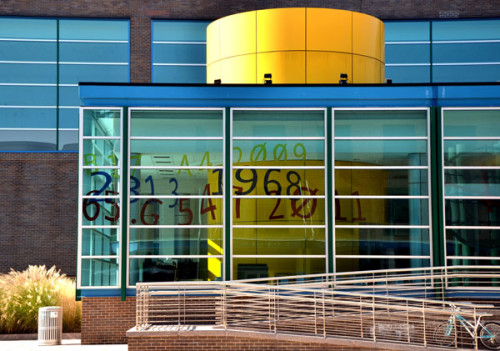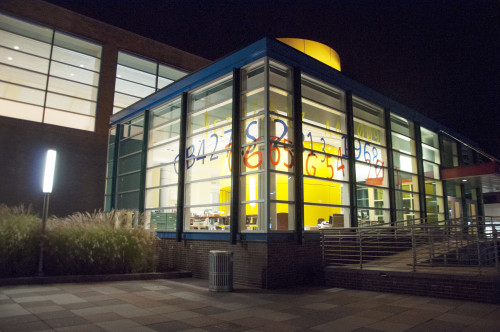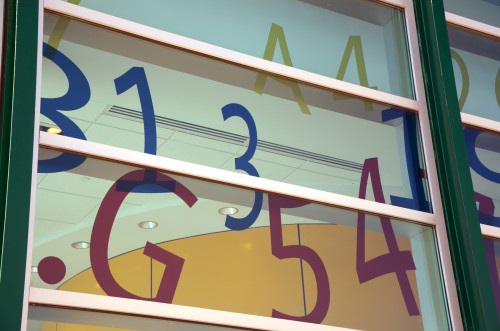2013–14: Olivia Fox ’13
“Are You Human?” Asks This Year’s Winner of the President’s Award for Public Art
The winner of the President’s Award for Public Art for 2013–14 was Olivia Fox ’13. Her installation, CAPTCHA, was on view adhered to the Library lobby’s upper windows, where it remained for one year.
Fox graduated in May 2013 with a major in printmaking and a minor in art history and refers to herself as a digital printmaker. With an interest in art historical figures like Andy Warhol and John Baldessari, both of whom subverted commercial printing methods into fine art, she’s drawn to large-scale advertising installations in attempt to determine how they’re printed.
For example, the appliques found on the windows of Grand Central Station during its centennial celebration not only caught her attention, but also left her wondering what she would do on that scale if she had enough money.
The Rhinebeck native worked at both her hometown library and in the library on campus digitally cataloguing books and digitizing images and documents. She often thought how, despite technology, users still had this personal, human experience of searching the shelves for a book.
“What stuck with me most was the act of digitally filing books for people to find, but then thinking about how people discover the information they want. Nestled around that book on the shelf are others related to what they’re looking for, so there’s a physical space for their brains to think about what they need,” she recalls.
A web design class led Fox to develop a fascination with the groundbreaking work and tragic story of the renowned mathematician Alan Turing—commonly referred to as the father of computer science and artificial intelligence—which left her to contemplate further how people use technology and how information is spread.
For Fox, CAPTCHA* falls at the crux of these ideas: large-scale, advertising-like prints; the spread of information; and technology. She plays with the notion that her piece is a virtual check to ensure that those who enter the library are humans with good intentions and not malicious bots seeking to misuse the information inside. “I wanted to treat the library as this bastion of physical data that is protected and here for everybody,” she explains.
Furthermore, she hopes viewers will not only decipher the codes, but actually follow the trail to where they lead and discover the secrets therein.
The organizer of 2013’s Zine Feast on campus, she hopes to present more events for artists in the future as well as pursue additional opportunities for public art pieces of her own.
(*CAPTCHA is an acronym that stands for Completely Automatic Public Turing test to tell Computers and Humans Apart.)


